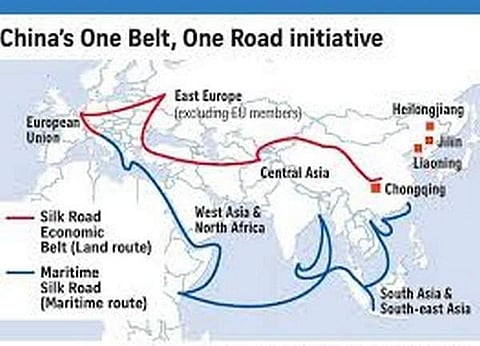

BEIJING: China is trying to use the Tibetan Buddhism as a soft power tool to further its ambitious multi-billion dollar Belt and Road Initiative (BRI) in the region as it developed Tibet to become Beijing's gateway for trade to South Asia through Nepal, according to experts.
China is vigorously pursuing the BRI, a pet initiative of President Xi Jinping, which offered billions of dollars of loans for infrastructure projects to different countries as it looks to expand global influence.
The BRI, however, evoked negative reactions in India as the controversial multi-billion dollars China Pakistan Economic Corridor (CPEC) remained its flagship project.
India has protested to China over the CPEC as it is being laid through the Pakistan-occupied Kashmir.
In a new initiative, China held a two-day symposium in northwest China's Qinghai Province on Tuesday to discuss how Buddhism could better serve BRI and resist separatism, state-run Global Times reported.
Tibetan monks and scholars took part in the event, the report said.
Tibetan Buddhism in which the Dalai Lama plays a pivotal role has following in different countries besides India.
It has strong following in countries like Nepal and Mongolia.
Elaborating on the symposium, Qin Yongzhang, a research fellow at the Chinese Academy of Social Sciences (CASS), told the Global Times that Tibetan Buddhism can serve as a bridge between the BRI countries to better communicate with each other since the religious and cultural beliefs are similar in Central and South Asia.
One immediate challenge of promoting the BRI through Tibetan Buddhism comes from India, which has been holding back for geopolitical reasons, Qin said.
The Dalai Lama has established a separatist base in India, and has been advocating the "traditional culture" as leverage to expand his influence, Qin added.
China in recent years has developed infrastructure in Tibet with rail, road and air connectivity.
It is now in the process of establishing a rail link to Nepal with plans to connect to India.
The CASS and the state-run China Tibetology Research Centre attach strategic importance to the project to promote China's BRI through Tibetan Buddhism, Qin said.
Soft power like religion, if used properly, will convert to hard power, Xiong Kunxin, an ethnic studies professor at Tibet University in Lhasa, told the daily.
During this year's International Buddhist Conference, Yin Shun, the deputy head of China's Buddhist Association, noted that the construction of the China-proposed BRI has injected new energy into China-Nepal ties, the report said.
China also built a relationship with Mongolia through Tibetan Buddhism, Qin said, noting that Mongolia has sent monks to study at the Lama Temple and High-level Tibetan Buddhism College of China, both located in Beijing.
Buddhism has a significant role in curbing separatism, religious extremism and terrorism while implementing the BRI because it pursues harmony and opposes violence, Xiong said.
The Tibet Autonomous Region will benefit from the BRI, which will stabilize the region and boost its economy by developing border trade and cultural tourism, wrote Zhao Kejin, deputy director of Tsinghua University's Institute of International Studies in an article published on ifeng.com.
Tibet has more than 1,700 Tibetan Buddhist temples, 46,000 monks and nuns, Zhou Wei, chief of the China Tibetology Research Centre's Institute for Religious Studies, had said.